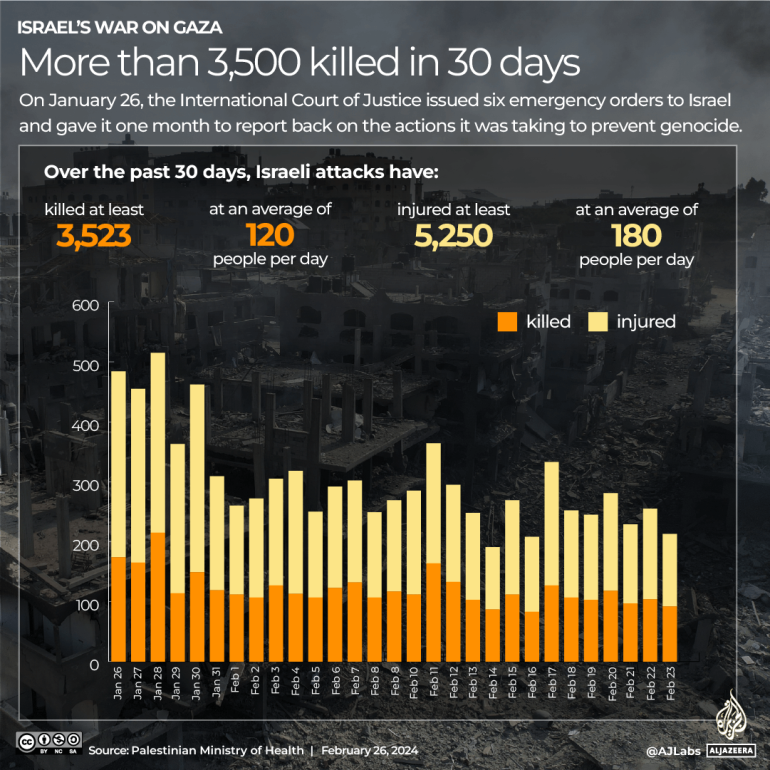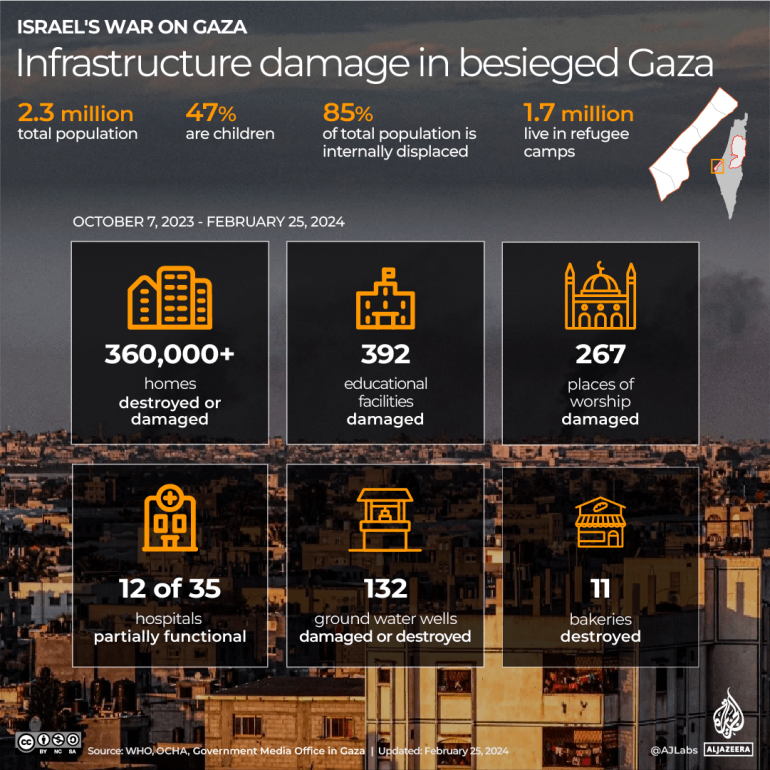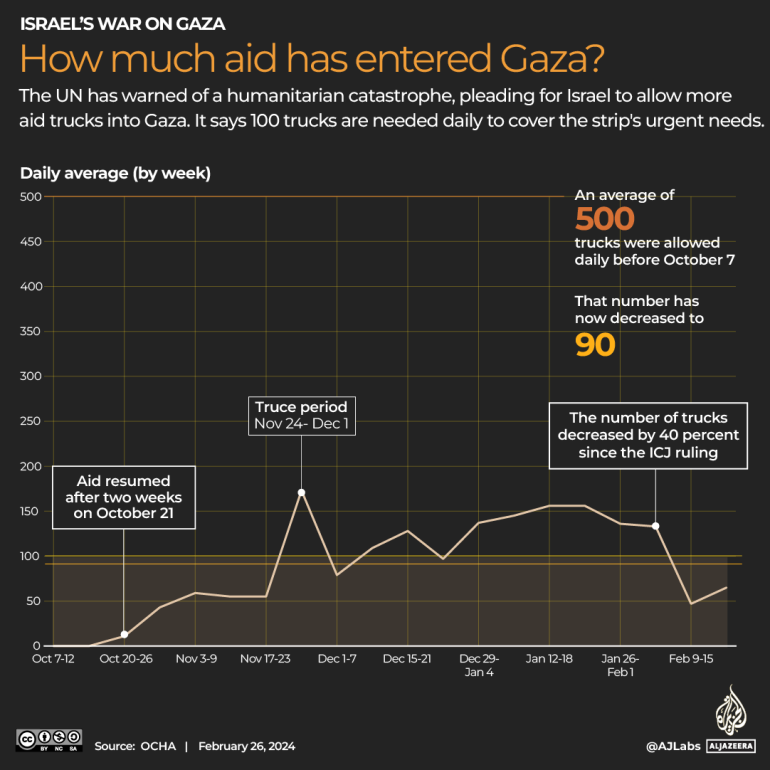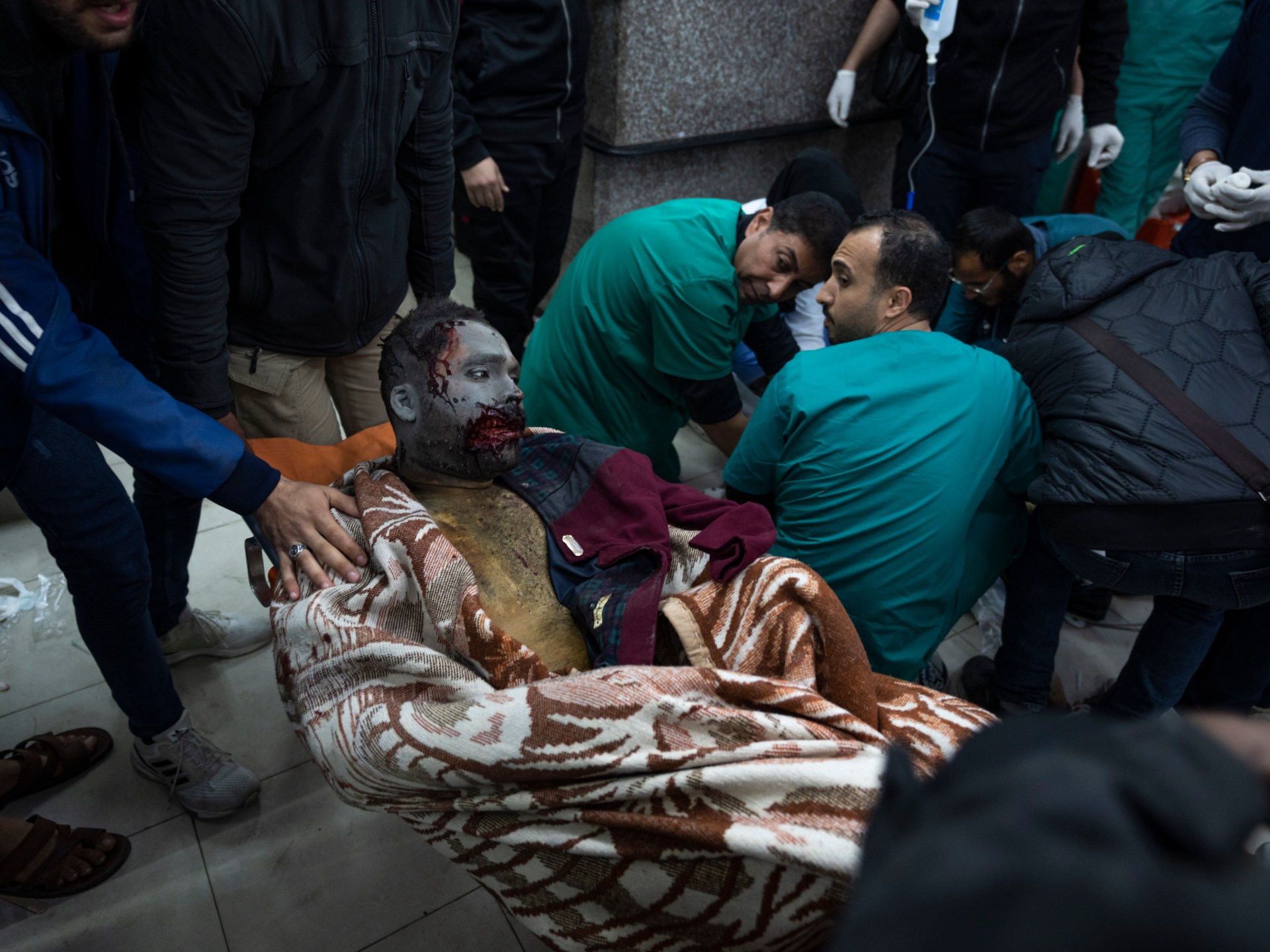Has Israel complied with ICJ order in Gaza genocide case?
Israel is expected to submit a report to the International Court of Justice (ICJ) on Monday on the measures it has taken to prevent possible genocide in Gaza. This is to assess whether Israel complied with the provisional measures ordered by the ICJ on January 26.
South Africa, which brought the case, says Israel has failed to comply with the measures. “I believe the rulings of the court have been ignored,” said Foreign Minister Naledi Pandor.
Here are the measures the ICJ ordered, as we look at whether Israel followed through in the past month since the ruling.
What provisional measures did the ICJ rule?
The six provisional directions the ICJ gave on January 26 are:
- Israel must take all possible measures to prevent genocidal acts as outlined in Article 2 of the 1948 Genocide Convention.
- Israel must ensure its military does not carry out the aforementioned actions.
- Israel must prevent the destruction of evidence of war crimes in Gaza and allow fact-finding missions to access it.
- Israel must submit a report to the ICJ on how it intends to deliver the above measures within a month of the ruling.
- Israel must prevent and punish incitement of genocidal acts.
- Israel must ensure the delivery of basic services and essential humanitarian aid to civilians in Gaza.
Did Israel follow the ICJ ruling?
Article 2 of the Genocide Convention entails not killing members of a particular group and not causing physical or psychological harm to members of that group, not inflicting living conditions which are calculated to bring about the end of the existence of a people, and not carrying out actions designed to prevent births within that group of people.
The ruling also added that Israel is supposed to ensure its military does not take such action and that Israel should punish direct and public incitement to commit genocide in relation to the Palestinians in Gaza.
Between the January 26 ruling and February 24, Israeli attacks have killed at least 3,523 Palestinians, according to the Palestinian Ministry of Health. An average of 120 Palestinians were killed every day. At least 5,250 Palestinians were injured in Israeli attacks.

Many of these attacks were air raids on central and southern Gaza throughout the month, targeting residential areas, schools, hospitals and even refugee camps. Palestinians left in the northern region, now totally devastated, have been starving as Israel has placed heavy restrictions on aid delivery.
Israel laid siege on al-Amal Hospital and Nasser Hospital in Khan Younis – a tactic repeated from the earlier phase of the war when Gaza’s largest medical facility, al-Shifa Hospital, was crippled by siege and shelling. Israel has said hospitals were being used as command centres by Hamas but it has yet to provide concrete proof for its claims.
Israel has since partially withdrawn from the Nasser Hospital but it deployed snipers, who fired on people approaching the largest hospital in the south.
Numerous cases of torture, killings and torching of civilian homes have been reported in clear disregard to the ICJ order last month.
Israeli far-right politicians and ministers have continued to use anti-Palestine rhetoric that campaigners say is genocidal, particularly open calls for the forced displacement of Palestinians from Gaza.
Israel also targeted Rafah, the southernmost part of Gaza which now shelters about 1.5 million Palestinians most of whom fled earlier phase of the war. Escalating air raids and shelling have increased the death toll as Israeli Prime Minister Benjamin Netanyahu made his intentions clear to invade the southern region bordering Egypt.

Has Israel allowed humanitarian aid into Gaza?
Human Rights Watch on Monday said Israel had failed to comply with at least one measure in ICJ’s order by obstructing basic aid to Gaza and using starvation as a weapon of war.
“The Israeli government is starving Gaza’s 2.3 million Palestinians, putting them in even more peril than before the World Court’s binding order,” said Omar Shakir, Israel and Palestine director at Human Rights Watch. “The Israeli government has simply ignored the court’s ruling, and in some ways even intensified its repression, including further blocking lifesaving aid.”
The flow of humanitarian aid has been badly affected after several Western donors led by the United States suspended funding to UNRWA, the UN agency for Palestinian refugees, in the wake of Israeli accusation that UNRWA staff were involved in the October 7 Hamas attacks that triggered the latest conflict. According to the UNRWA chief, Israel has yet to provide evidence in support of its allegations.
UNRWA warned that this could lead to the agency being unable to provide humanitarian aid to Gaza, which would plunge the enclave into starvation. On Sunday, a two-month baby died due to starvation in Gaza City, as famine grips the besieged enclave.
On Monday, UNRWA said an average of less than 100 aid trucks have reached Gaza per day in February, far below its target of 500. These deliveries brought in just 50 percent of the amount of aid that was delivered in January, UNRWA said in its latest situation update.

On some days in February, less than 10 trucks entered Gaza. Only seven trucks entered on February 9, nine entered on February 12, four on February 17, and nine again on February 19.
Bezalel Smotrich, Israel’s far-right finance minister, said on February 13 that he had blocked a US-funded flour shipment to Gaza because it was going to UNRWA.
Footage from February 19, verified by Al Jazeera, showed Palestinians in northern Gaza scattering after hearing gunshots while they were lining up for food aid. Israeli forces shot at least one Palestinian man dead and injured several others when they opened fire on a crowd awaiting food.
UNRWA made an announcement on February 7 saying some of its aid trucks carrying food into Gaza were bombed, purportedly by Israeli forces on February 5.
What happens if Israel fails to follow ICJ’s ruling?
If it is found not to have complied with the ICJ’s legally binding orders, any UN Security Council member state may refer the matter to the UNSC, which would then vote on whether to require Israel to abide by the provisional measures.
If it still refuses to do so, Israel could face UN sanctions, which could include economic or trade sanctions, arms embargoes and travel bans. The UN Charter also allows the UNSC to go a step further and intervene with force.
An adverse verdict from the court might prevent Israel’s allies from sending weapons as happened in the Netherlands, where a court blocked the supply of equipment for the F35 fighter jets used to bomb Gaza. The Dutch government has challenged the order.
However, any sanctions may be vetoed by the US, Israel’s closest ally. It has vetoed three ceasefire resolutions on Israel since October 7.
In the statement, HRW said other countries should press Israel’s government to comply with the orders through sanctions and embargoes.




